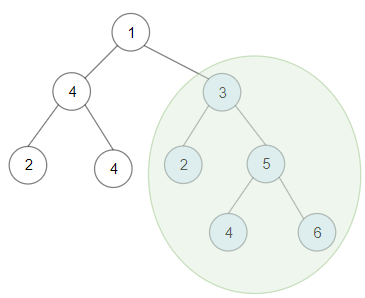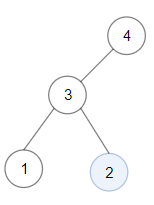Hard BST Problem
Usually BST (Binary Search Tree) problems are not that hard, but this one is: https://leetcode.com/problems/maximum-sum-bst-in-binary-tree/


The hint in the problem description gives you exactly what needs to be done. Here is the gist of it:
a) With 4 x 10^4 nodes, your solution will have to be either O(n) or O(nlogn). n^2 will timeout.
b) The node values are there just to specify the limits for the variables initialization
c) The solution that I came up with is O(n)
d) The solution is based on Post-Order Tree Traversal
e) The approach will be to check right, check left, and if both are valid BST, check for the possibility of a BST with the current node
f) Based on (e), update the max sum
g) Return the proper values for the current node (remember that the post-order traversal you process right, left then the current node)
h) Finally, be relentless and you'll succeed
Code is below, cheers, ACC.
public class Solution
{
public int MaxSumBST(TreeNode root)
{
int maxVal = -100000;
int minVal = 100000;
int sumVal = 0;
int retVal = Int32.MinValue;
MaxSumBST(root, ref maxVal, ref minVal, ref sumVal, ref retVal);
return retVal < 0 ? 0 : retVal;
}
private bool MaxSumBST(TreeNode node,
ref int maxVal,
ref int minVal,
ref int sumVal,
ref int maxSum)
{
if (node == null) return true;
if (node.left == null && node.right == null) //Leaf
{
maxVal = node.val;
minVal = node.val;
sumVal = node.val;
maxSum = Math.Max(sumVal, maxSum);
return true;
}
int leftMaxVal = -100000;
int leftMinVal = 100000;
int leftSumVal = 0;
bool isLeftBST = MaxSumBST(node.left, ref leftMaxVal, ref leftMinVal, ref leftSumVal, ref maxSum);
int rightMaxVal = -100000;
int rightMinVal = 100000;
int rightSumVal = 0;
bool isRightBST = MaxSumBST(node.right, ref rightMaxVal, ref rightMinVal, ref rightSumVal, ref maxSum);
sumVal += leftSumVal + rightSumVal + node.val;
maxVal = Math.Max(node.val, Math.Max(leftMaxVal, rightMaxVal));
minVal = Math.Min(node.val, Math.Min(leftMinVal, rightMinVal));
if (isLeftBST &&
isRightBST &&
(node.val > leftMaxVal || node.left == null) &&
(node.val < rightMinVal || node.right == null))
{
maxSum = Math.Max(maxSum, sumVal);
return true;
}
return false;
}
}
1373. Maximum Sum BST in Binary Tree
Hard
Given a binary tree
root, the task is to return the maximum sum of all keys of any sub-tree which is also a Binary Search Tree (BST).
Assume a BST is defined as follows:
- The left subtree of a node contains only nodes with keys less than the node's key.
- The right subtree of a node contains only nodes with keys greater than the node's key.
- Both the left and right subtrees must also be binary search trees.
Example 1:

Input: root = [1,4,3,2,4,2,5,null,null,null,null,null,null,4,6] Output: 20 Explanation: Maximum sum in a valid Binary search tree is obtained in root node with key equal to 3.
Example 2:

Input: root = [4,3,null,1,2] Output: 2 Explanation: Maximum sum in a valid Binary search tree is obtained in a single root node with key equal to 2.
Example 3:
Input: root = [-4,-2,-5] Output: 0 Explanation: All values are negatives. Return an empty BST.
Example 4:
Input: root = [2,1,3] Output: 6
Example 5:
Input: root = [5,4,8,3,null,6,3] Output: 7
Constraints:
- Each tree has at most
40000nodes.. - Each node's value is between
[-4 * 10^4 , 4 * 10^4]
a) With 4 x 10^4 nodes, your solution will have to be either O(n) or O(nlogn). n^2 will timeout.
b) The node values are there just to specify the limits for the variables initialization
c) The solution that I came up with is O(n)
d) The solution is based on Post-Order Tree Traversal
e) The approach will be to check right, check left, and if both are valid BST, check for the possibility of a BST with the current node
f) Based on (e), update the max sum
g) Return the proper values for the current node (remember that the post-order traversal you process right, left then the current node)
h) Finally, be relentless and you'll succeed
Code is below, cheers, ACC.
public class Solution
{
public int MaxSumBST(TreeNode root)
{
int maxVal = -100000;
int minVal = 100000;
int sumVal = 0;
int retVal = Int32.MinValue;
MaxSumBST(root, ref maxVal, ref minVal, ref sumVal, ref retVal);
return retVal < 0 ? 0 : retVal;
}
private bool MaxSumBST(TreeNode node,
ref int maxVal,
ref int minVal,
ref int sumVal,
ref int maxSum)
{
if (node == null) return true;
if (node.left == null && node.right == null) //Leaf
{
maxVal = node.val;
minVal = node.val;
sumVal = node.val;
maxSum = Math.Max(sumVal, maxSum);
return true;
}
int leftMaxVal = -100000;
int leftMinVal = 100000;
int leftSumVal = 0;
bool isLeftBST = MaxSumBST(node.left, ref leftMaxVal, ref leftMinVal, ref leftSumVal, ref maxSum);
int rightMaxVal = -100000;
int rightMinVal = 100000;
int rightSumVal = 0;
bool isRightBST = MaxSumBST(node.right, ref rightMaxVal, ref rightMinVal, ref rightSumVal, ref maxSum);
sumVal += leftSumVal + rightSumVal + node.val;
maxVal = Math.Max(node.val, Math.Max(leftMaxVal, rightMaxVal));
minVal = Math.Min(node.val, Math.Min(leftMinVal, rightMinVal));
if (isLeftBST &&
isRightBST &&
(node.val > leftMaxVal || node.left == null) &&
(node.val < rightMinVal || node.right == null))
{
maxSum = Math.Max(maxSum, sumVal);
return true;
}
return false;
}
}




Comments
Post a Comment